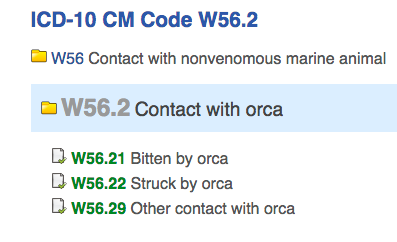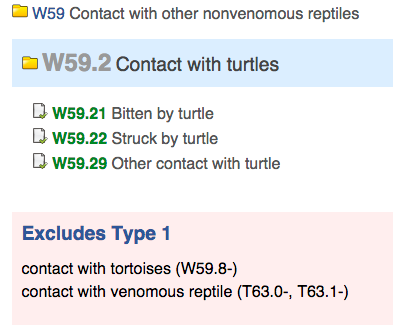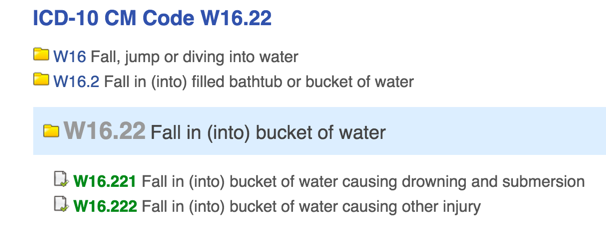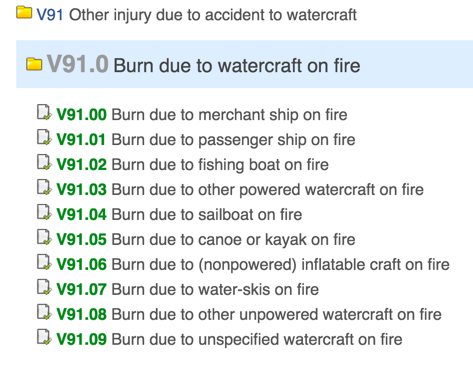ICD-10
« previous post | next post »
Fred Pelzman, "The Craziness of ICD-10", MedPage Today 7/2/2015:
At our faculty meeting last week, representatives of the medical college and the hospital came to update us on the changes coming into effect with ICD-10.
The compliance officers went through the changes in regulations — for inpatients and outpatients — which we've all heard before, the changes in the rules, and how ICD-10 leads to greater specificity for billing. Almost to the point of ridiculousness.
Medical websites, articles, and blogs have been full of examples of hilarious insane ICD-10 codes, new ones that many of us will (hopefully) never use in a lifetime of practice.
If there exists one for fall from nonmilitary spacecraft, does that mean that there are military spacecraft? Are we sending Marines into space?
I'm sure someone has a practice where their patients are frequently coming in after being bitten by Orcas, and it's nice to know there's a code to bill for that if I need it, but all of this leads to a level of mental exhaustion, that we're all being put upon, asked to do something else that adds no real value to our care of patients.
There is definitely an ICD-10 code for being bitten by an orca:

This helps to clarify how there could be an ICD-10 code (W59.22) for being struck by a turtle:

I was not able to verify the existence of an ICD-10 code for falling from a non-military spacecraft, but there certainly is an ICD-10 code for being burned due to water-skis on fire:
And some of the ICD-10 code points seem not just over-precise or unlikely, but actually impossible, like "fall in (into) bucket of water":

Somewhere in heaven, David Hume and Jorge Luis Borges are buying rounds for the bar and having a good laugh. See "El Idioma Analítico de John Wilkins" — a fragment from an English translation may point you in the right direction:
Once we have defined Wilkins' procedure, it is time to examine a problem which could be impossible or at least difficult to postpone: the value of this four-level table which is the base of the language. Let us consider the eighth category, the category of stones. Wilkins divides them into common (silica, gravel, schist), modics (marble, amber, coral), precious (pearl, opal), transparent (amethyst, sapphire) and insolubles (chalk, arsenic). Almost as surprising as the eighth, is the ninth category. This one reveals to us that metals can be imperfect (cinnabar, mercury), artificial (bronze, brass), recremental (filings, rust) and natural (gold, tin, copper). The whale belongs to the sixteenth category; it is an oblong viviparous fish.
These ambiguities, redundancies and deficiencies remind us of those which doctor Franz Kuhn attributes to a certain Chinese encyclopaedia entitled 'Celestial Empire of benevolent Knowledge'. In its remote pages it is written that the animals are divided into: (a) belonging to the emperor, (b) embalmed, (c) tame, (d) sucking pigs, (e) sirens, (f) fabulous, (g) stray dogs, (h) included in the present classification, (i) frenzied, (j) innumerable, (k) drawn with a very fine camelhair brush, (l) et cetera, (m) having just broken the water pitcher, (n) that from a long way off look like flies.
The Bibliographic Institute of Brussels exerts chaos too: it has divided the universe into 1000 subdivisions, from which number 262 is the pope; number 282, the Roman Catholic Church; 263, the Day of the Lord; 268 Sunday schools; 298, mormonism; and number 294, brahmanism, buddhism, shintoism and taoism. It doesn't reject heterogene subdivisions as, for example, 179: "Cruelty towards animals. Animals protection. Duel and suicide seen through moral values. Various vices and disadvantages. Advantages and various qualities."
I have registered the arbitrarities of Wilkins, of the unknown (or false) Chinese encyclopaedia writer and of the Bibliographic Institute of Brussels; it is clear that there is no classification of the Universe not being arbitrary and full of conjectures. The reason for this is very simple: we do not know what thing the universe is. "The world – David Hume writes – is perhaps the rudimentary sketch of a childish god, who left it half done, ashamed by his deficient work; it is created by a subordinate god, at whom the superior gods laugh; it is the confused production of a decrepit and retiring divinity, who has already died" ('Dialogues Concerning Natural Religion', V. 1779). We are allowed to go further; we can suspect that there is no universe in the organic, unifying sense, that this ambitious term has. If there is a universe, its aim is not conjectured yet; we have not yet conjectured the words, the definitions, the etymologies, the synonyms, from the secret dictionary of God.
I would add that one of the things we do know about the universe is that it's not well described by a tree-structured ontology.

Jake LW said,
July 2, 2015 @ 6:21 pm
Just in reference to part of the first blockquote, "If there exists one for fall from nonmilitary spacecraft, does that mean that there are military spacecraft? Are we sending Marines into space?" Yes, there are military spacecraft, but no we (probably) aren't sending Marines into space. For the last few years the USAF has been testing a miniature space-shuttle called the X-37, though the official story is that they haven't been crewed missions, the newest itteration could carry crew.
Simon Spero said,
July 2, 2015 @ 6:33 pm
Don't forget , ICD-11 is in beta test
It has not yet been illustrated .
ICD-10 is an interesting hybrid classification scheme ; the scheme is enumerated, but many codes are synthetic, with gaps where classes that would have been even more ridiculous are omitted. I have been waiting to try and sneak what would have been the code for an injury due to falling from waterskis onto a chart just to see if the insurance company mainframes literally explode.
Not sure what the code for that is.
Steve T said,
July 2, 2015 @ 6:39 pm
"one of the things we do know about the universe is that it's not well described by a tree-structured ontology"
The question is whether diseases, injuries, causes of them, etc., can be described by a tree-structured classification system. IANAD, but it sounds useful, if not perfect. Even the article says "They have done an excellent job, it's pretty seamless."
One thing the article doesn't mention, but I suspect is true, is that most medical bills are read by computers not people. Doctors have to provide the input, true, but they don't have to know all of it to use it.
Bruce Rusk said,
July 2, 2015 @ 7:10 pm
Falling into a bucket is not impossible, and is a real cause of death for infants. For example.
maidhc said,
July 2, 2015 @ 7:22 pm
There's a hospital in California that needs a code for "struck by dolphin".
http://www.nbcnews.com/news/us-news/dolphin-leaps-familys-boat-breaks-moms-ankles-n385426
Rubrick said,
July 2, 2015 @ 7:39 pm
"ICD-10 leads to greater specificity for billing. Almost to the point of ridiculousness."
I feel that this is stretching the word "almost" to its limits.
Bloix said,
July 2, 2015 @ 7:46 pm
The protagonist of the French film Rust and Bone (De rouille et d'os) is a trainer at a marine tourist park who loses both legs when attacked by an orca.
[(myl) Such things have happened in the real world, not long ago. But the specificity is capricious — there is no ICD-10 code for stepping on a sea urchin, for example, although that is a potentially serious thing that happens to hundreds of thousands of people for every one who is bitten by an orca, and also requires rather specific kinds of treatment. Instead you'd have to bill for "T63.69, toxic effect of contact with other venomous marine animals". And that code wouldn't really be right if the problem was not toxicicity but simply embedded spines.]
Bloix said,
July 2, 2015 @ 7:47 pm
It appears that there are, on average, about one orca attack a year.
https://en.wikipedia.org/wiki/Killer_whale_attacks_on_humans
Chris C. said,
July 2, 2015 @ 8:33 pm
@maidhc — That'd be W56.02.
David Morris said,
July 2, 2015 @ 9:29 pm
There is a joke about a medical insurance company which refused to pay a claim for treatment for burns because the claimant had been smoking in bed. "No I wasn't," said the claimant. "The bed was on fire when I got into it". Likewise, one could claim that one's waterskis were on fire when one strapped them on.
octopus said,
July 2, 2015 @ 10:48 pm
I was about to say that the ancient Greek tragedian Aeschylus would appreciate W59.22, since legend has it he was killed when an eagle mistook his bald head for a rock and dropped a tortoise on it. But it appears there is no code for tortoise strikes, only "Struck by other nonvenomous reptiles" (W59.82).
I wonder how many doctors can tell a turtle strike from a tortoise strike.
D.O. said,
July 2, 2015 @ 11:14 pm
Prof. Liberman, a bit closer to your home may be a system of classification of the parts of speech and diagramming sentences. You even advocated teaching it (again?) in schools. Are they neatly fall into the tree-like classifications.
Jeroen Mostert said,
July 2, 2015 @ 11:58 pm
The challenge now becomes suffering an injury not covered by ICD-10, baffling doctors and regulators alike.
CLThornett said,
July 3, 2015 @ 12:20 am
Bruce Rusk beat me to the point about toddlers and buckets–although in the case I know of the baby, although pulled out at once, died later from lung damaged caused by the cleaning solution in the bucket. Would that count as a bucket incident or a hazardous domestic chemical one?
Adam F said,
July 3, 2015 @ 3:04 am
Did Wilkins really classify a whale as a kind of fish, or did Borges make that bit up? ISTR Aristotle worked out that whales are mammals.
cM said,
July 3, 2015 @ 3:52 am
I'm always slightly surprised by the codes on those "ICD-x hilarities" lists: Those codes seem way too short for the amount of specificity.
But I have no idea how sparse that tree might be in some places, and also have to admit that I haven't done any additional maths about that, so it's a "felt shortness".
According to the Wikipedia entry, the largest variant, ICD-10 PCS, has very roughly 100000 codes – this really doesn't seem (again: feel) to be enough for stuff like "struck by turtle".
Stephen said,
July 3, 2015 @ 3:55 am
Following on from Bruce Rusk & CLThornett, my first thought about droning in a bucket was that bucket probably meant 'moveable container' and so could be quite big.
Also, bucket seems to be a building term for a pretty large container, see
http://www.wickes.co.uk/Wickes-Flexible-Yellow-Bucket-40L/p/160179
http://www.wickes.co.uk/Wickes-Storage-Bucket-Black-69L/p/191176
Both easily large enough to drown a child.
Sili said,
July 3, 2015 @ 3:56 am
Wouldn't it make sense if these categories are based on past experience? Isn't there something about more people dying getting out of bed than are killed by sharks? With 300M USAnians, unlikely injuries are bound to happen. I agree that below some rate of incidence, it would probably make more sense to just call it "Other injury". But I'm not a programmer.
Oskar Sigvardsson said,
July 3, 2015 @ 6:14 am
@cm: "I'm always slightly surprised by the codes on those "ICD-x hilarities" lists: Those codes seem way too short for the amount of specificity."
That struck me as well, but if you do the multiplication, it seems plenty: it seems like it works by having an initial letter (A-Z), a number between 0-99, a period, and then another number between 0-99. That would make for 26*100*100 = 260,000 codes, which should probably be plenty.
I'm wondering about the hierarchy, though. You rather limit yourself by having the top level only have 26 categories. Why not just do it like an IP address or something, having numerical subcategories separated by periods? Then you could have as many levels of subcategories and subcategories per level as you want! There's presumably a material difference in treatment if an orca bites off your arm vs. your leg, right?
Terry Hunt said,
July 3, 2015 @ 8:25 am
@ Bruce Rusk
For a cause of death for infants occasioned by not using a bucket (or jug), see the music hall song commencing "Moi baibee has gorn dahn the plug'ole . . . ."
Vance Koven said,
July 3, 2015 @ 9:43 am
@maidhc: I'm reminded of an old Woody Allen joke. Is there a code for being hit by a falling whale at 81st Street and Central Park West?
Richard Hershberger said,
July 3, 2015 @ 10:05 am
Having just re-read Neal Stephenson's Baroque Cycle, I appreciate the shout-out to Wilkins.
CNH said,
July 3, 2015 @ 3:16 pm
I particularly liked the one about being burned by an inflatable boat on fire.
Mark Mandel said,
July 3, 2015 @ 8:35 pm
When is a hyperlink not a hyperlink?
When it's
http://El Idioma Analítico de John Wilkins
Mark Mandel said,
July 3, 2015 @ 9:24 pm
@Vance Koven: Oh no, not again!
Daniel Barkalow said,
July 4, 2015 @ 3:09 am
It's worth noting that V91.07 is a mechanical combination of V91.0 (burn due to watercraft on fire) with 7 (waterskis), out of the codes for watercraft which apply to anything involving watercraft. It makes plenty of sense to have a code for waterskis, considering how different they are and likely to injure people (in other ways than burning), and makes sense to apply the codes uniformly to all accidents involving watercraft, rather than needing to look up how to code the type of watercraft separately depending on how it caused an injury.
You don't want to add exceptions like: "Since waterskis don't catch on fire, when a watercraft on fire is called 'waterskis', it refers to an oil tanker, which is simply listed as a cargo vessel in accidents which could plausibly occur with waterskis."
Daniel Barkalow said,
July 4, 2015 @ 3:24 am
Also, V91.07 isn't even the strangest burning waterskis code. There's V90.27: not only were your waterskis on fire, you responded by jumping off them. On the other hand, the standard doesn't allow for the accidental overturning or sinking of waterskis, because those would be plausible alternative descriptions of falling off waterskis, and it wants to have only one code for any plausible event. With a boat, it can capsize, sink, throw you off, or you could fall off, and these are all distinguishable; with waterskis, they're not distinguishable, so only one of those codes is allowed.
Philip Resnik said,
July 4, 2015 @ 11:43 am
My favorite has always been W61.62XD: Struck by a duck, subsequent encounter. The transition to ICD-10 is certainly going to be interesting, come October. Note that this is turning out to be an opportunity for natural language processing solutions to (hopefully) make an important difference in the world: a number of key players in the healthcare industry are advancing NLP-enabled computer-assisted coding (CAC) solutions to assist human coders by "reading" the medical record and proposing codes for human coders to review, transforming the human role from code-generator to code-auditor. This could help ease what is otherwise going to be an incredibly painful transition. For computers, as well as for humans, the Zipfian nature of the code distribution is really important — the coding system allows for enough codes to cover anything you'd want, but happily you can get a really long way by doing very well toward the top of the distribution, and improve continuously toward the tail over time.
chris said,
July 5, 2015 @ 6:38 pm
My favorite has always been W61.62XD: Struck by a duck, subsequent encounter.
Subsequent encounter meaning that the duck knows you? That's what it looks like to me, at least.
Presumably the incidence of this code will provide valuable data on ducks' capacity to hold grudges. (Or maybe that's no news to experienced duck handlers, I wouldn't know.)
Incidentally, the possibility for more letter suffixes as you have demonstrated expands the code space far beyond Oskar Sigvardsson's calculation — two letters is a factor of over 600, and it's possible that they could use more if they needed them.
ohwilleke said,
July 6, 2015 @ 1:47 pm
"According to the Wikipedia entry, the largest variant, ICD-10 PCS, has very roughly 100000 codes – this really doesn't seem (again: feel) to be enough for stuff like "struck by turtle"."
I suspect that trauma is coded with much more detail than other kinds of medical conditions, with the party demanding the specificity being actuaries who hope to use the data to underwrite casualty insurance policies. Health insurers who cover almost all non-trauma injuries have to cover everything, so the details of cause of injury or death aren't nearly so important to them, hence, less detail.
Ed said,
July 6, 2015 @ 8:45 pm
You know it's bad when linguists are making fun of your taxonomy!
GH said,
July 7, 2015 @ 7:21 am
@ chris:
GH said,
July 7, 2015 @ 7:22 am
Meh, that was supposed to be an image link. Here: http://usercontent2.hubimg.com/2211213_f520.jpg
Viochita Fea said,
July 8, 2015 @ 10:47 am
Uh oh — Dawn Brancheau, the first and only human ever to have been partly consumed by an orca (Tilikum, SeaWorld Orlando) is not represented.
Orca bites are theme-park injuries like having one's nose broken by a bird while on a roller coaster (Fabio, Kings Dominion). No danger of an orca bite in the wild.
GregH said,
July 12, 2015 @ 7:15 pm
As someone who has to work with classifications (safety, injuries) and the resulting data, wouldn't it be better to have them constructed by taxonomists instead of obsessive amateur classifiers? In any case, there must be a shortage of taxonomists in the world. "See, there's a category for everything."
PubliusVA said,
July 13, 2015 @ 2:20 pm
@Viochita Fea: "No danger of an orca bite in the wild."
Well, there's been at least one case, according to Wikipedia. Hans Kretschmer in 1972.